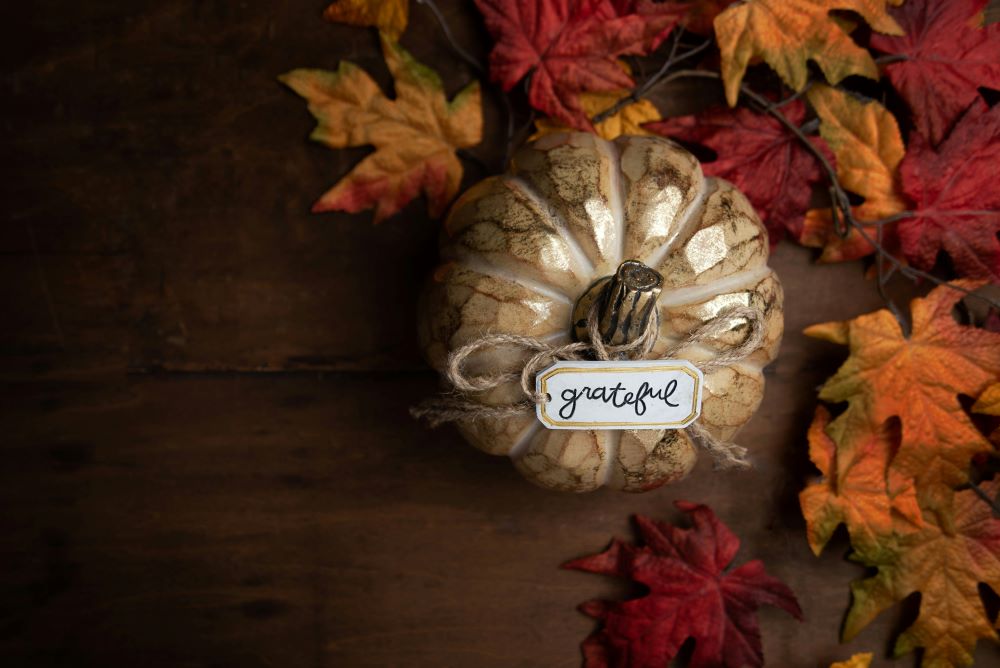
(Unsplash/Kit Ishimatsu)
Thanksgiving is a complicated holiday in the U.S. As some U.S. religious congregations reckon with their part in stripping Native American people of their culture and family ties through boarding schools, others explore possibilities for reconciliation and reparations through projects like the Nuns and Nones Land Justice Futures. With our eyes open to these realities, we have a long way to go to undo the patronizing and inaccurate Thanksgiving narratives about Europeans and Native Americans sitting down and sharing a meal.
Each year at Thanksgiving, I feel this tension. Part of me loves the harvest season, celebrating the fruits of the year, a day focused on gratitude when so much of U.S. consumeristic culture emphasizes "not enough." (Of course, the irony that Thanksgiving is traditionally followed in the U.S. by the biggest shopping day of the year is not lost on me.)
Given these complexities and how I am implicated in the historically damaging part of Thanksgiving, I have wondered if I should just stop celebrating this holiday altogether. I've tried including a prayer of reconciliation and acknowledgment of stolen land as part of my Thanksgiving Day prayer, but it doesn't feel like enough. Enjoying a day of delicious family recipes, gathering with loved ones, naps and games and football just feels tone deaf at a moment when there is real work to be done toward healing and reconciliation with Native Americans. How can I reconcile my love for pumpkin pie and the practice of gratitude with the racist history of this holiday?
This year I've found my feelings around Thanksgiving even more layered. I've spent the last few weeks processing the results of the U.S. election even as I accompany families on the move in Nogales, Mexico. In this context, my gratitude muscle feels atrophied. Fear and grief and disappointment have taken a front row seat as I remember the pain of witnessing and walking alongside community members facing detention and deportation during the first Trump administration. Sonia, Erika, Horacio, Jesús, Alicia … names and faces have flashed through my mind as I remember those whose lives were forever changed by our collective decision to elect a president who ran on an anti-immigrant platform. And on Nov. 5, 2024, we said yes again to a man who has promised mass deportations of our beloved community members.
At the Kino Border Initiative where I minister, we have been processing this reality both informally and more intentionally. We held a forum the day after the election to answer migrants' questions about what was to come. I listened as a mom asked about how this outcome would affect their ability to reunite with her U.S. citizen children, and a dad asked whether this would mean asylum protections were ended for good. We consoled and checked in on one another. I shared my feelings over chilaquiles with a colleague who had become a citizen just months before the election and voted for the first time on Nov. 5. Our director invited those of us who had accompanied migrant families during the first Trump administration to reflect on what got us through those years of family separations, raids and ramped-up deportations.
How can I reconcile my love for pumpkin pie and the practice of gratitude with the racist history of this holiday?
It's a good question. As I reflected on what kept me going during those years, I found that the image of Thanksgiving gatherings actually provided an apt metaphor. Though my experience of Thanksgiving over the years has varied in location and cast of characters, it has always been about collectivity. A motley crew brings what they have and what they can offer to the table. We spend time together, long hours of chatting and eating, commiserating and celebrating. The dishes and roles vary. Sometimes conversation is strained or rowdy, but we make the collective decision to sit across the table from each other. We dedicate the time. Throughout the day, people do what they need to do. Some take walks, others nap. Introverts might enjoy the football game while the extroverts play a boisterous round of euchre, a famously Midwestern card game. Some arrive late, others leave early. It's messy and unpredictable and we all show up anyway.
Images of the collectivity I experienced during the first Trump administration echo these elements. We gathered. Oh boy, did we gather. By the dozens, by the hundreds and by the thousands. We came together around kitchen tables, in houses of prayer, in the streets and in the halls of power. We each offered what we had to the beautiful potluck of resistance. Some made phone calls and others wrote letters. Some marched in protest while others strengthened them with food and prayers. Some raised their voices through art, song, creative signs or knitted hats. We commiserated, we celebrated, and we rested. We took on different roles. It was messy and unpredictable and we all showed up anyway.
Though my gratitude practice is not as easily accessible to me these days, I do find comfort in the elements that I know have sustained me and will sustain me in the coming weeks, months and years: coming to the table with others, leaning on our relationships, each of us bringing what we have, sharing and resting and seeking nourishment as needed. I experience solace in knowing that this same table fellowship sustained our brother Jesus through miracles and success as well as trials and persecution. May we continue to make the collective decision, as Jesus did, to sit across the table from one another.
Advertisement





